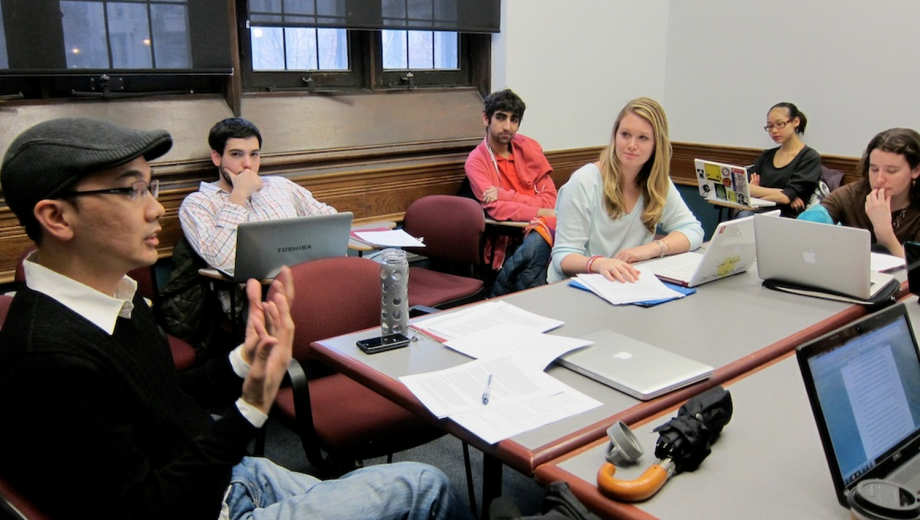On breaking bad habits
We all make the same mistakes at first: with language, point of view, characterization, all those things. I try to help students recognize elements of bad writing in their work—when you can recognize those elements and remove them from your writing, then you’re producing good writing.
For example, a lot of students don’t yet fully appreciate what a good sentence is. They can write sentences that are readable but they don’t know what a beautiful sentence is just yet, and especially what a bad sentence is; they don’t know how to recognize it. Also, I don’t think a lot of students understand how crucial point of view is. They think of it in an arbitrary way.
The third thing is that they’re great at coming up with a premise, but they don’t know how to come up with a story for it. I get a lot of stories that are just all premise, premise and then resolution, but the real meat of the story—the most interesting part, the body of the story where things escalate and become problematic for characters—that’s the part that they completely forget. Weirdly enough, sometimes it’s really difficult to see that. They’ll come up with an ending—“Oh, this is a great idea, I’m gonna put this on paper, I’m gonna create this situation”—but then most of the story is them presenting that situation and just leaving it at that, then tacking on a conclusion. I’ve noticed that with almost 70 percent of the stories I get.
Then there’s the extra layer of this process, which is great writing. And I don’t quite know how to teach that. I can help students recognize and aspire to great writing and give them examples of what I believe it is, and hopefully be inspiring in that way. But I don’t know if you can really teach great writing. In my opinion, that’s some sort of mysterious thing that people just have or don’t have.
On teaching UChicago students
At a school like this, where there’s so much rigor, a lot of students feel intimidated. Even though they do well, they still feel intimidated and stifled by that kind of esoteric, cold, and depersonalized scholarship. I think creative writing allows them to be honest about themselves in a way they normally aren’t in a regular academic class.
On his own writing and editing
Nowadays, it’s crucial to me that the narrative voice is really convincing and interesting. The plot can be awesome, but if the prose and style aren’t convincing or interesting, I don’t care. When I write, I think of plot first, and the voice comes out of that. So I let those things lead me. But different projects start at different places—certain projects will start with plot, and others will start with a philosophical idea or a setting. At the end of the day, for me it’s always about the story and the characters and the prose.
When you bring an editorial eye to something, you try to create a distance that allows you to see it from a point of view that’s more objective and not so personal. You might like something personally but if it doesn’t really work, you have to recognize that and remove it. But you also have to maintain a closeness to your writing so that it does have those elements that make it great to you. It’s back and forth, back and forth.
I enjoy writing, but it’s basically me wrestling with stuff at my desk all the time, getting to the point where I satisfy myself. I always tell students that you have to get to a point where you trust yourself as a writer, and that means pleasing your number-one reader, which is yourself. It’s really hard to get to that point, to feel like, “Okay, I’ve written something that’s not only compelling but really convincing.” It changes from day to day—you could be pleased by it one day and the next day just think it’s s---.
On his first novel
It’s currently titled This or Any Desert, but that will probably change. Here’s a short description:
Two years after his Vietnamese wife divorces him, Robert Ruen, a 20-year veteran of the Oakland Police, drives to Las Vegas to hunt down her abusive new husband and punish him for hurting the woman he still loves. Sonny Nguyen, the new husband, turns out to be a degenerate poker player, a smuggler of exotic fish, and a very violent, unforgiving man. Robert ends up fleeing the city after brutal altercations with him and his son, Junior, who runs his father’s business and might be even more dangerous.
Five months later, Sonny's men break into Robert's apartment in Oakland and threaten him with distressing news. Suzy, his ex-wife, has inexplicably disappeared, and Sonny is forcing Robert to return to Las Vegas to find her for him. Over the course of a single day, Robert investigates the mysterious hotel room in downtown Las Vegas where Suzy, a manic depressive, has been spending all her time. He meets a young female poker player who turns out to be Suzy’s daughter, Mai, whom Suzy abandoned when she was 5. With Mai’s reluctant help, his search ends up taking him all over the city and into Suzy’s sordid history with Sonny, which began on a refugee island in Malaysia two decades ago and includes a host of secrets that the reader will learn in the novel’s secondary narrative, a series of letters that Suzy has written to Mai to explain everything she has done.


